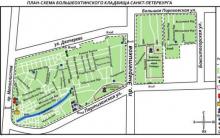Good afternoon, dear readers of the blog that talks about... Today I decided to touch upon such interesting and fairly common abbreviations in the English written language as i.e. and e.g. I'll tell you about meaning each of these abbreviations, and will also show by example when to use “i.e.” and when to use “e.g.”.
Latin abbreviations "i.e." and "e.g." can be found quite often in English literature, and indeed in everyday written language. To go further, these abbreviations would be used even more often if people were more confident in understanding when to use “i.e.” and when to use “e.g.” Therefore, to begin with, I propose to understand what these simple abbreviations mean.
I.E. - Meaning? I.E. -What does Abbreviation mean?
Abbreviation i.e. usually inserted into a sentence as a substitute for “that is.” The abbreviation came to English from the Latin language and in its unabridged version was written as “id est”. I.e. It is appropriate to use the phrases “in other words” or “that is” as a substitute (as mentioned above). This abbreviation is used when something needs to be emphasized more clearly or clarified.
E.G. - Meaning? E.G. -What does Abbreviation mean?
“E.g.” means "for example". Like the first abbreviation, the abbreviation e.g. comes from the Latin expression “exempli gratia” (“for the sake of example”). “E.g.” appropriate to use when you do not intend to list everything that is currently being discussed.
Examples of using “i.e.” and “e.g.” :
Example 1: Places
I.E. (Id Est)
Example sentence
I am going to the place where I relax best, i.e., the coffee shop.
Explanation
[There is only one place that, in my opinion, is the best place to relax. Using “i.e.” I show everyone that I especially love to relax in this place.]
E.G. (Exempli Gratia)
Example sentence
At the places where I relax well, e.g., Tchibo, I have none of the distractions I have at home.
Explanation
[Exists a large number of coffee shops that I like, for example, one of them is the Tchibo coffee chain]
The abbreviation “e.g.” can be used with several examples at once, but do not end all your examples with “etc”. No need to write: I like coffee shops, e.g., Tchibo, Starbucks, etc. Instead, it is better to write like this: There is debate as to whether some of the Ottonian emperors (e.g., Saint Henry II and Otto I the Great) were evil.
Example 2. Helen of Troy and her brothers and sisters
I.E. (Id Est)
The most beautiful human in Greek mythology, i.e., Leda’s daughter Helen, may have had a unibrow, according to a 2012 book on Helen I’m reading.
[Helen, whose beauty caused the outbreak of the Trojan War, is considered the most beautiful woman according to Greek mythology. She does not and cannot have any rivals.]
E.G. (Exempli Gratia)
The children of Leda, e.g., Castor and Pollux, were born in pairs.
[It is believed that a pair of boys, with the names Castor and Pollux, could be twins, but as for all the other children of Helen of Troy, historians are not so sure. According to Greek mythology, Helen was hatched from an egg, but despite this unusual birth, she was able to give birth to a number of twins, and Castor and Pollux are one example.]
Italics I.E. and E.G.
Abbreviations i.e. and e.g. - these are such common Latin abbreviations that it is absolutely not necessary to put them in italics.
Every English user working in business has had to deal with the translation of documents, business vocabulary, and business abbreviations. Such abbreviations are found all the time in the business sector. They exist for convenience and brevity of business language.
Using abbreviations and acronyms in business English languageAbbreviations help make business dialogue short, concise and specific, they also help save time, which is very important for a business person. We bring to your attention the main English abbreviations of business vocabulary, their decoding, translation and example sentences with these abbreviations.
Pay attention to the following abbreviations and their place in sentences in English:
- @ (= at sign)- "dog" sign
This symbol is commonly used in Internet symbols, and most often in addresses. mailboxes. For example: - a/c (= account)- account, account
Give me your a/c, please. — Give me your account, please - AGM (= annual general meeting)— annual general meeting
Don’t forget that on Monday we have the AGM of our company. — Don't forget that we have our annual general meeting on Monday. - a.m. (= ante meridiem)- before noon
Our session begins at 9 a.m. — Our session starts at nine in the morning (until noon) - ATM (= automated teller machine)- ATM
Did you get your salary? -I should try in the ATM. -Have you received your salary? -I should try at the ATM - attn (= attention, for the attention of)- for someone's attention
This abbreviation is usually used in letters: This is attn of your brother. - This is for your brother's attention. - approx. (= approximately)- approximately
We have approx. two hours to finish the work. — We have approximately 2 hours to finish the work - CEO (= chief executive officer)- main Executive Director
May I see the CEO of your company? — Can I see the chief executive officer? - Co (=company)- company
This is produced by Andrews and Co. — It is produced by Andrews and company - dept (=department)- department, section
Please, pass to the next dept. — Please go to the next department - e.g. (=exempli gratia)- For example
Complete this scheme, e.g. like in this document. — Fill out this diagram, for example, as in this document - EGM (= extraordinary general meeting) - extraordinary general meeting
What is the cause of the EGM? -I think that the chief will announce it. - What is the reason for the emergency general meeting? - I think the boss will announce it - ETA (= estimated time of arrival)- estimated time of arrival
The ETA of the production is five-seven days. — Estimated time of arrival of products 5−7 days - etc (= et cetera)- And so on and so forth
Complete the questionnaire: write your name, the date of your birth, your profession, etc. — Fill out the form: write your name, date of birth, profession, etc. - GDP (= gross domestic product)— gross domestic product (= GDP)
The chief is pleased of the GDP. — The boss is happy with the GDP - GNP (=gross national product)— gross national product (= GNP)
The GNP of the country is enough. — The country’s GNP is quite sufficient - GMT (=Greenwich Mean Time)— Greenwich mean time
What is the GMT? — What is the average time in Greenwich?
Abbreviations for Business English
Often used in business correspondence following types abbreviations:
- i.e. (= id est)- that is
We did everything right, i.e. we have success. - We did everything right, that is, we will be successful - Inc (=incorporated)- incorporated, registered as a corporation
May be sure, our company is inc. — You can be sure that our company is incorporated - IPO (= initial public offer)— initial public offering of shares
I shall see the IPO of the bank. — I'll look at the bank's initial public offering. - K- thousand
- lb- pound (measure of weight)
- £ - pound (currency)
- Ltd (= limited)- limited liability company
Our company is ltd. — Our company is a limited liability company - mo. (= month)- month
- no. (= number)- number
Give me the document no.3, please. - Give me document number 3, please. - Plc. (= public limited company)- public limited liability company
What do you know about The United Co? It is the plc., you know. — What do you know about United Co.? It is a public limited company - p.m. (=post meridiem)- afternoon
We'll meet at 5 p.m. — We will meet at five in the afternoon - PR (= public relations)- public relations
What is your PR? — What are your relations with the public? - p. s. (= post scriptum)— afterword
This abbreviation is used in letters: See you soon. P.S. Don’t forget the books. - See you. P.S. Don't forget the books - qty (= quantity)- quantity
What qty of people does he need? - How many people do we need? - re- concerning, relatively (usually used in letters)
Re our affair, you know what to do. - Regarding our business, you know what to do.
What are abbreviations for?
Knowledge, understanding and use of professional jargon and business slang in English is essential if you work in an international company, as well as in collaboration with foreign partners. For the same purposes, you need to know English abbreviations and abbreviations in communication. Using abbreviations will help you save time, which is very important in business.
Note the abbreviation ASAP (As Soon As Possible) — As soon as possible. Four whole words! We remove all unnecessary things and get only four letters. Or another example: YTD (Year To Date) — year to date. This abbreviation shows the performance of a business from the beginning of a financial or calendar year in relation to its status today.
In general, you can see that using abbreviations is very convenient in business. This approach to business vocabulary will help you in your business.
IN modern century saturated with information, there is less and less time for communication and correspondence. No matter how paradoxical it may sound, the more information a person has, the more ways he looks for to reduce it and transmit it in a more condensed form. One of the most the best ways to shorten words and expressions is to use abbreviations.
Today they are found everywhere in general English, in business correspondence, in SMS messages and chats, and in international terms. Many of them are used quite often, so not only for students of English, but also for ordinary to modern man It’s worth mastering a couple of the most common ones.
Abbreviation(Italian abbreviatura from Latin brevis - short) - a word formed by an abbreviation of a word or phrase and read by the alphabetical name of the initial letters or by initial sounds words included in it.
Abbreviations are found in every language in the world and play a huge role. Sometimes ignorance or incorrect use of a particular abbreviation in English can lead to a rather awkward situation or misunderstanding of what the interlocutor wants to express with a particular phrase.
Let's look at an example of the incorrect use of a fairly well-known abbreviation LOL(laughing out loud - laugh loudly, out loud).
Messages
Mom: Your beloved aunt just passed away. LOL
I: Why is that funny?
Mom: It’s not funny, David!
I: Mom, LOL means “laughing out loud”.
Mom: Oh my goodness! I thought it means “lots of love”...I sent it to everyone! I need to call everyone…
Messages
Mom: Your favorite aunt just passed away. LOL
Me: What's so funny about that?
Mom: This is not funny, David!
Me: Mom, LOL means "laugh out loud".
Mom: Oh God! I thought it meant lots of love...
I sent this to everyone! We need to call everyone back...
Most popular abbreviations
This list of abbreviations can be found everywhere and you are probably familiar with most of them visually, but let’s pay attention to their correct translation and use.
- V.I.P. (very important person)- very important person;
- P.S.(from Latin “post scriptum”) - after what is written;
- A.D.(from Latin “Anno Domini”) - our era;
- B.C. / B.C.E. -before Christ- before Christ / before Common Era- BC;
- ASAP (as soon as possible)- As soon as possible;
- UNO (United Nations Organization)- UN;
- UNESCO (United Nations Educational, Scientific and Cultural Organization)- UNESCO;
- a.m.(ante meridiem, in the morning)- in the morning;
- p.m.(postmeridiem, in the afternoon)- In the evening;
- i.e. ( id est , that is)- it means;
- e.g. ( exemplary gratia , for example)- For example;
- u (you)- You;
- etc.(from Latin et cetera) - and so on;
- 2G2BT (too good to be true)- too good to be true;
- 2moro (tomorrow)- Tomorrow;
- 2day (today)- Today;
- BD or BDAY (birthday)- birthday;
- 2nite (tonight)- In the evening;
- 4ever (forever)- forever;
- AFAIK (as far as I know)- as far as I know;
- BTW (by the way)- by the way;
- RLY (really)- really, really;
- BRB (be right back)- I'll be back soon;
- TTYL (talk to you later)- we’ll talk later, “before we get in touch”;
- IMHO (in my honest opinion)- in my opinion, in my opinion;
- AKA (also known as)- also known as;
- TIA (thanks in advance)- thanks in advance.
Let's look at the use of the abbreviations given above in examples:
- According to my work schedule I need to come to work at 8 a.m.-According to my work schedule, I need to come to work at 8 am.
- AFAIK this concert will be held 2day.-As far as I know, the concert will be held today.
- All these events happened in 455 B.C.- All these events took place in 455 BC.
- I invite u to my BD 2nite.- I invite you to my birthday tonight.
- BTW she was RLY good at Math at school. - By the way (by the way) she was really good at mathematics when she was in school.
- I"m sorry. I"m in hurry. TTYL.-I'm sorry, I'm in a hurry. Let's talk later.
The abbreviations in English are described quite interestingly general purpose in this video:
Business letters and abbreviations
Writing business letters and composing business correspondence today requires high-quality study and a careful approach. When faced for the first time with the design and decoding of abbreviations in business English, a beginner sometimes experiences confusion and bewilderment as to what it all means. The difficulty lies in using this or that abbreviation correctly, as well as in the specifics of business vocabulary. However, as in any area of language learning, knowledge and a little practice will help you overcome any difficulties.
A number of abbreviations are used only in writing, but in oral speech are pronounced full forms words:
- Mr. (mister)- Mister;
- Mrs. (mistress)- Mrs.
- Dr. (Doctor)- doctor;
- St. (Saint/Street)- saint or street;
- Blvd. (boulevard)- boulevard;
- Ave. (avenue)- avenue;
- Sq. (square)- square;
- Rd. (road)- road;
- Bldg. (building)- building;
- B.Sc. (Bachelor of Science)- Bachelor of Science;
- M.A. (Master of Arts)- Master of Arts;
- Ph.D. (Doctor of Philosophy)- PhD;
- M.D. (Doctor of Medicine)- Doctor of Medical Sciences.
Most popular business reductions English words are given below:
- Co (company)- company;
- PA (personal assistant)- personal assistant;
- Appx. (appendix)- application;
- Re. (reply)- answer;
- p. (page)- page;
- smth. (something)- something;
- smb. (somebody)- somebody;
- vs ( lat. versus)- against;
- etc. ( lat. et cetera)- And so on.
Popular three-letter acronyms ( TLA or Three-Letter Acronyms) in the business sphere:
- CAO (Chief Administrative Officer)- Administration Manager;
- CEO (Chief Executive Officer)- chief executive officer (CEO);
- exp. (export)- export - removal of goods beyond the borders of the country;
- HR (human resources)- HR service of the enterprise;
- HQ (Headquarters)- main department of the company;
- LLC (limited liability company)- limited liability company (LLC);
- R&D (research and development)- Research and development;
- IT (information technology)- information Technology.
Examples business correspondence using abbreviations :
- Dear Mr. Braun, our Co will be glad to offer you the position of CAO.- Dear Mr. Brown, our company will be glad to offer you the position of chief accountant of the company.
- Dear Ms. Stone, my PA will definitely contact you about changes in exp. process - Dear Miss Stone, my personal secretary will contact you regarding changes in the export process.
Chats and SMS
As stated above, in English there are Three Letter Acronyms ( TLA or Three-Letter Acronyms), which help shorten and condense fairly large phrases into 3 letters. Today, this is a fairly popular way to save time when correspondence on social networks.
- BFN (bye for now)- see you later, bye
- BTW (by the way)- By the way
- FYI (for your information)- for your information
- JIT (just in time)- during
- IOW (in other words)- in other words, in other words
- NRN (no reply is necessary)- no answer required
- OTOH (on the other hand)- on the other side
As for SMS abbreviations, there are a huge number of them.
The specificity of such abbreviations is that it can be almost impossible to decipher without a detailed analysis.
- GL (good luck)- Good luck!
- GB (good bye)- Bye
- DNO (don't know)- Don't know
- ASAYGT (as soon as you get this)- as soon as you receive it
- B4 (before)- before
- BC (because)- because
- BON (believe it or not)- believe it or not
- BW (best wishes)- best wishes
- BZ (busy)- busy
- CYT (see you tomorrow)- see you tomorrow
- Wish you G.L. on your exam. Mom. - I wish you good luck in the exam. Mother.
- Sorry. BZ. C.Y.T.- I am sorry. Busy. See you tomorrow.
- I will be JIT. G.B.- I'll be on time. Bye.
For a detailed overview of English abbreviations for words in SMS, we recommend visiting, which contains 2000+ abbreviations.
As we can see, the topic is quite extensive, but don’t be scared! After encountering acronyms and abbreviations in English several times, you just can't help but fall in love with them for their originality and help in saving you time. And once you love something, you will definitely and easily remember it!
We suggest you choose a couple of abbreviations for yourself right now and surprise your loved ones with improved communication! BFN and watch your step while texting!
Big and friendly EnglishDom family











Dua for Sadness Anxiety and Depression
Buddhism: the basics of religion, how many Buddhists are there in the world
Obligatory prayers: features and order of performance by men
Druid horoscope by date of birth: interpretation and features
What is oregano: all about the amazingly healthy seasoning!